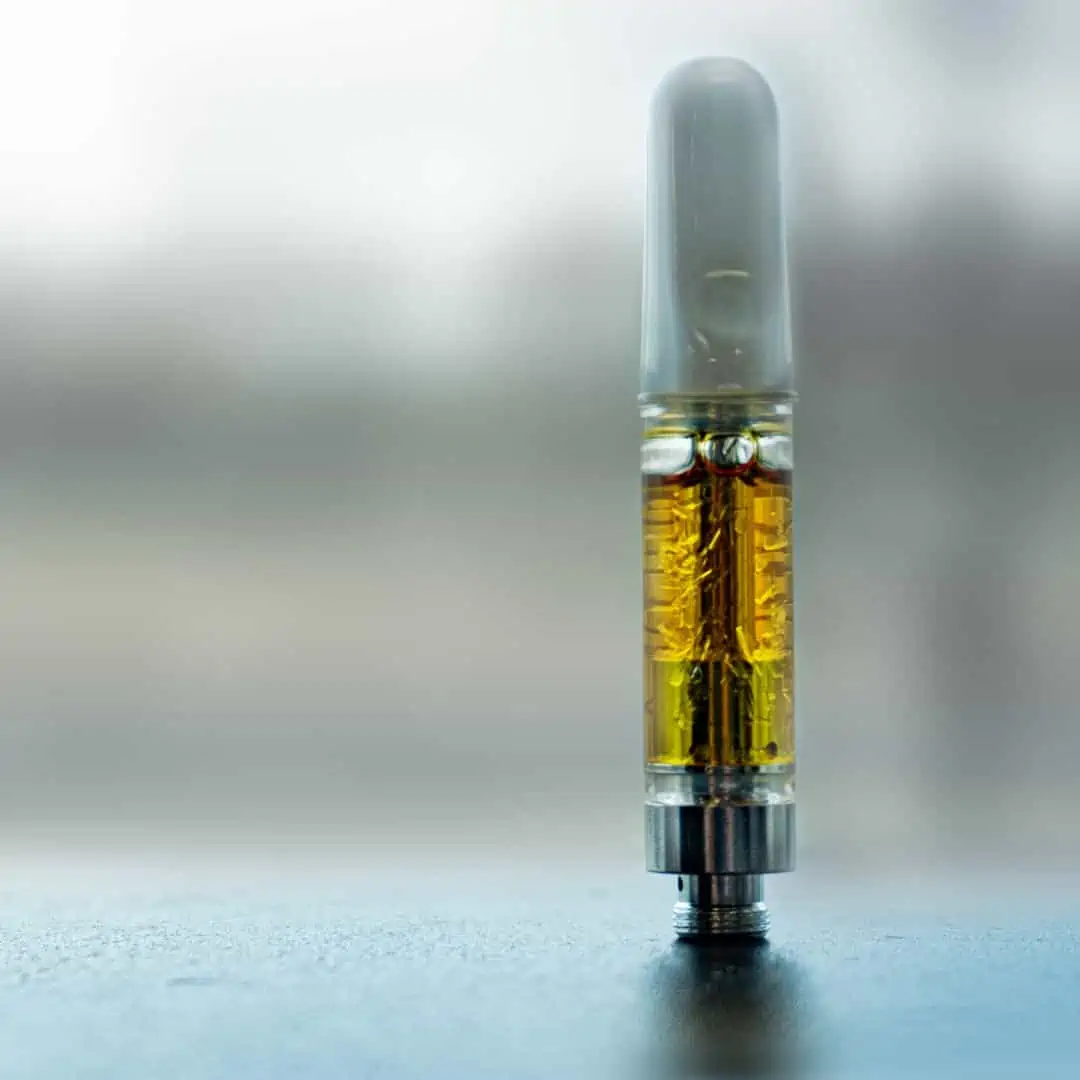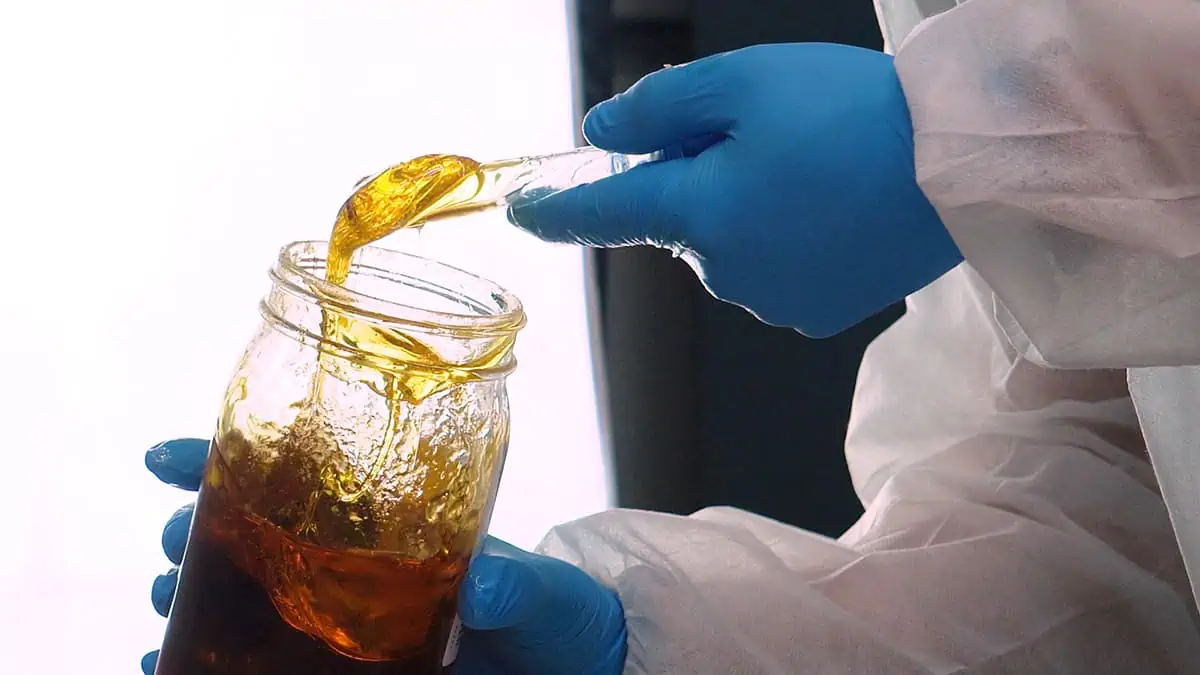The world of cannabinoid extraction is in constant flux. New derivatives of the many hundreds of plant compounds are always being studied, derived and formulated into products – all while balancing on the legality set forth by the FDA. The newest, hottest cannabinoid sweeping the market now, Delta 8, is particularly unique in its potential and controversy. In this article, we’ll discuss the potential, the controversy and the somewhat hazy future of Delta 8.

Delta 8 THC can be a number of colors from crystal clear, to honey, to dark brown
Delta 8 is now arguably the most popular new product in the hemp market. It is a cannabinoid naturally found in hemp plants, but in much lower levels than Delta 9 and CBD. Like many major cannabinoids, this special hemp compound is derived from cannabigerolic acid (CBGA). Once Delta 9 is created through decarboxylation and can be oxidized, Delta 8 is then created.
Making Delta 8 can be done by manipulating this process through biochemical synthesis and supercritical CO2 extraction. Higher quantities of Delta 8 can be collected for a number of product formulations. So, why is this cannabinoid becoming so popular? What makes it so unique? And, what does the future hold under the cloud of legal uncertainty?
What’s the Difference Between Delta 8 and Delta 9?
Delta 8 THC and Delta 9 THC share a very similar molecular structure, but one slight variance differentiates the two. There are single and double bonds in the molecular structure of these compounds and the placement of these bonds are important in differentiating various them. Delta 8 and Delta 9 have double bonds in a similar, but not identical place. They are not all too different from each other in the way they behave, but there are obvious differences in their effects. Both are psychoactive compounds that bind to the CB1 and CB2 receptors in the endocannabinoid system that are involved in altering mood, behavior, perception, etc., but their strength level differs. Because of this, Delta 8 is considered to be more mild than Delta 9. Let’s go into further detail of the effects, benefits and detriments of Delta 8.
While the effects are similar between both of these cannabinoids, Delta 8 is considered to be generally less powerful compared to Delta 9. While both Delta 9 and Delta 8 interact with the exact same endocannabinoid receptors, the efficacy of Delta 9 tends to be more significant as reported from users of both these cannabinoids. The chemical structure of Delta 8 and Delta 9 is nearly identical apart from a slight alteration in the positioning of 2 electrons in its own structure. Though the variation is slight, that chemical difference is the main reason behind its legality, its effects, and its use in hemp derived products.
Medicinal Potential of Delta 8
With over 100 cannabinoids, how does the Delta 8 cannabinoid differ in benefitting the end user? Delta-8-tetrahydrocannabinol is a unique and very individualized cannabinoid making its potential for medical use promising. Although there have been some studies on Delta 8, however, the medical and therapeutic benefits could likely vary from person to person.
Anxiety
Generally, Delta 8 is found to produce similar effects of Delta 9 without common side effects like anxiety and paranoia, which are often reported with Delta 9. In fact, Delta 8 reportedly suppresses anxiety based on user experience. It could potentially be an anxiolytic agent, meaning it inhibits anxiety. This was originally studied in the 1970’s in rats and eventually was administered to pediatric cancer patients in 1995. Slow progress on researching the advantages Delta 8 has been made, but even previous studies could reveal prosperous benefits.
Nausea
Nausea and vomiting is a common symptom of numerous ailments and a negative impact of several distinct treatments – chemotherapy for cancer as an example. Similar to Delta 9, Delta 8 may very well be an antiemetic agent, or anti-nausea compound. While this a similar property of Delta 9, the legality and less potent effects of Delta 8 means that its use has more potential reach for those who are sensitive to Delta 9 or who are outside of a state with recreational use.
Pain
An interesting effect that Delta 8 has on the human body is unique to corneal damage and pain and neuroprotective properties as well. Also, because of its considerably reduced psychoactive properties, the usage of Delta 8 could be more safely administered to individuals otherwise negatively affected by Delta 9, especially kids and those sensitive to the side-effects of their more potent Delta 9.



One of the most common products for Delta 8 THC is in the form of vaporizer cartridges
The legality of Delta 8
In the DEA’s list of controlled substances, tetrahydrocannabinols are listed as illegal, so wouldn’t that contain Delta 8? According to the 2018 Farm Bill, this might not be the case. In Section 12619(b) of the Farm Bill, tetrahydrocannabinols are specifically mentioned stating that any kind of product from the hemp plant containing a Delta 9 content of 0.3% is legal at the federal level. Though this is the case, certain state legislation does vary meaning Delta 8 and other cannabinoid based products might be illegal despite being derived from hemp. Because of this, it is critically important to check and abide by state laws as both a producer and a consumer.
Because Delta 8 is similarly psychoactive like Delta 9, there are plenty of perceived issues with its use, legality and morality in the United States and other countries around the world. Both producers and consumers who approve of the medicinal and recreational benefits of Delta 8 are diving into the potentials as a substitute for the still federally illegal Delta 9. Those who disapprove, however, see Delta-8 as nothing more than a legislative loophole to let people get high.
Despite push-back from some, it is critical that medicinal and recreational studies of Delta 8 continue for the benefit of the industry. Although psychoactive properties are notable in Delta 8, the fact that the intoxicating effects are considerably less potent opens the possibility of a replacement for those sensitive, apprehensive, or simply in disagreement with the use of Delta 9.

The Future of Delta 8
The 2018 Farm Bill has undoubtedly opened the door for wide opportunities associated with the hemp plant. While cannabinoids like CBD have proven to provide considerable benefits in terms of medicinal potential, new opportunities surround compounds like Delta 8 and other cannabinoids derived from the hemp plant. It is understood that this industry will only increase in potential, profitability and promise with increased opportunities such as this.
While there is some controversy surrounding tetrahydrocannabinols like Delta 8 the risks associated with it are often misconstrued when compared to the wide array of benefits in medicinal and recreational applications. Of course, it is critical to be mindful of the responsibility necessary surrounding these compounds. This should be the case whether using, or producing these products in order for them to be a beneficial aspect of the industry as a whole. As new cannabis compounds like Delta 8 emerge on the market, that responsibility must increase with it in order to ensure a consistent progression of the hemp industry in the future.



